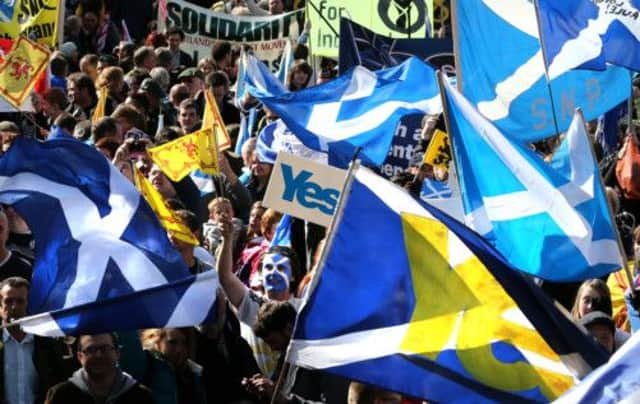Brian Ferguson: Independence, arts & culture of fear


There are many times I’ve had cause to seriously ponder whether politicians should be added to the list. Fifteen years covering local government shenanigans in first Falkirk, then Edinburgh, have left a few scars – and a serious lack of trust or faith in the majority of those elected to public office.
Last week, an odd coincidence saw the sad passing of a former colleague from my time in Falkirk and a genuine political earthquake emanate from the town within a matter of days.
Advertisement
Hide AdAdvertisement
Hide AdIt had me recalling an era when the town was rarely out of the headlines – either thanks to Dennis Canavan’s long-running feud with Tony Blair and Donald Dewar, or the endless in-fighting with Falkirk Council.
Many of the clashes became distasteful and personal, particularly in the by-election which heralded the arrival of Eric Joyce into the Commons.
In Edinburgh, last week brought news that two interminable sagas – dogged by politicking – seem to be finally reaching a conclusion.
Yet we had one arm of Edinburgh City Council telling businesses when they can expert the long-delayed tram project to finally get under way, while politicians are publicly saying something entirely different. And for all the posturing around the project, the one thing that has gone ominously quiet is the prospect of an inquiry at which those meddling politicians and highly paid officials found wanting may finally be brought to book.
Meanwhile, last week’s appointment of John Donnelly to head Marketing Edinburgh – a body with a remit to promote the capital to the world – is merely the latest chapter in an affair stretching back almost as far as the tram debacle. It has been marked by bitter disputes with VisitScotland, hijacked brands, backroom deals, personality clashes and political stitch-ups.
Little wonder, then, that the debate over next year’s independence referendum has left me cold. And I know I’m not alone in already being weary of the sound of politicians trading blows on a daily basis. The bickering, scaremongering and grandstanding of most contributors would be depressing enough without the thought of another 15 months or so before the fun really starts.
While the result of the referendum is anyone’s guess, the one certainty seems to be that the debate will get more heated as the clock counts down. And increasingly it is the debate about the debate that is proving more interesting.
In the arts world, there is a vocal, growing body of support in favour of independence. And, curiously, many of those figures seem keen to distance themselves from politicians.
Advertisement
Hide AdAdvertisement
Hide AdBut questions are being asked about why no-one of note from the culture sector is coming out against independence, or even calling it into question. One factor surely must be the risk of alienation – or antagonism – from certain quarters. Following comic Susan Calman’s experiences after cracking gags about the SNP on a BBC radio show, are people really too terrified to go against the apparent tide of opinion?
Even the most fervent “Yes” supporter in the arts must have noticed how little genuine debate has been generated thus far. They must also surely be considering whether that situation is healthy.
While there are admirable attempts by the Edinburgh International Book Festival to stir up debate this summer, it is perhaps telling that the panels for its two sold-out independence showdowns are yet to be announced.
I suspect a lot of artists in the “no” or “don’t know” camps will simply keep quiet, to either avoid flak or cut the chances of missing out on work.
Millions are being spent on the various Commonwealth Games, Bannockburn, Homecoming and Ryder Cup campaigns next year. A lot of work for artists is out there with these supposedly non-political ventures. It would be naive for people not to consider the impact of speaking out against independence, especially after it featured so prominently in culture secretary Fiona Hyslop’s recent keynote speech setting out her “vision” for the sector.
But does all this mean the independence debate has bred a culture of fear among artists around speaking out? And will that benefit either side when next year’s referendum comes around?